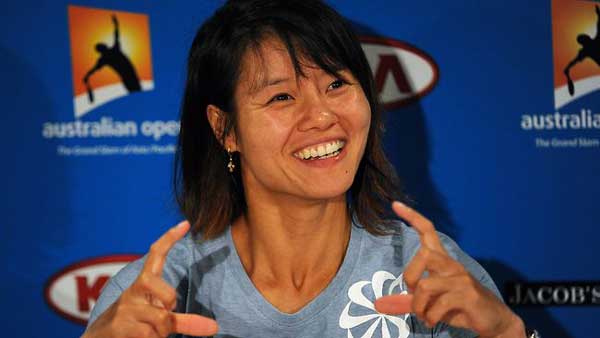Stars
New breed: China's stylish new winners
(China Daily)
Updated: 2011-06-19 08:37
 |
Large Medium Small |
 |
|
Li Na shares a joke with reporters after her Australian Open final defeat by Kim Clijsters, January 2011 file photo. [Photo/Xinhua] |
Chinese star power on the courts, pool and track is making the world sit up and applaud. These modern-day sports celebrities are not afraid to show off their individuality compared to their determinedly anonymous predecessors of a couple of decades ago. Sun Xiaochen and Yu Yilei put this new phenomenon under the microscope.
When Li Na took the microphone from Jean Gachassin, president of the French Open, during the award ceremony, the packed audience at Court Philippe Chatrier held its breath. They were waiting for the newly crowned French Open winner and China's first Grand Slam champion to speak, expecting one of her colorful and sometimes unexpected spiels. Fresh from her epic victory over defending champion Francesca Schiavone of Italy, Li Na delivered. She thanked sponsors, tournament director, linemen, chair umpire and her team in English and even added a birthday greeting in the Wuhan dialect for a friend sitting in the stands with her husband.
She wrapped it up by thanking her growing legion of fans, which drew the loudest applause from the international crowd.
It seemed like a flawless victory speech, but it was what she did not say that caused an unexpected stir back in China.
"She did not thank the Chinese Tennis Association (CTA)," a fan fumed on an Internet forum while reminding everyone that CTA chief Sun Jinfang had been sitting right beside the Chinese ambassador to Paris, Kong Quan, at the stands.
"She did not even thank China and the Chinese people!" the fan ranted.
It was a decided departure from what Chinese supporters expected in the past. It would have been unimaginable for an athlete from China on the winner's podium not to start a speech with a litany of gratitude for coaches, club and country. If indeed they spoke at all.
Chinese sportsmen, previously, were as much known for their reticence in facing the media and the public as their athletic prowess. They were individually colorless, looked the same, dressed the same and blended into a background of collective solidarity.
"I cannot visualize what would have happened if Li gave the same speech back in the 1980s," says Yang Xinwei, a veteran sport reporter with China Daily who has been following the scene for the past 27 years.
"At that time, Chinese athletes were kept aloof. They did not want to talk to the media and public and avoided every opportunity to do so."
Yang recalled his first overseas assignment in 1987 to cover the World Gymnastics Championship in the Netherlands where China ranked third in the medal tally with two golds and two silvers.
"Even I did not get a chance to talk with the Chinese athletes apart from at the press conference," he remembers.
In probably the most extreme example, four-time Olympic winner and diving diva Fu Mingxia answered all media questions with an "I don't know" in Chinese - even when she was asked: "How old are you?"
The then 10-year-old had just won the women's platform title at the 1990 World Goodwill Games in Seattle and had been primed by team leaders worried she was too young to handle media queries.
Li Na, once known as a maverick because of her outspoken ways and frequents bust-ups with the CTA, has effectively broken the stereotype of the strong but silent Chinese athlete, emphasizing a phenomenon she did not start but probably best represents.
She has tattoos on her chest and lower back that boldly declare her affection for her husband. She dyes her hair different shades and she's not afraid to speak out - like when she directed a furious "Shut up!" to the crowds when they became too noisy in-between points at the Beijing Olympics tournament.
But it was during her court performance at the Australian Open this year that she charmed the world with her humor and her wit. While fielding questions after her games, she showed off her unflappable sportsmanship when she joked about her husband on court, in English.
"I will always admire her tennis first. But it was her charming personality that made us want to sign her," says Max Eisenbud, vice president of sports marketing giant International Management Group (IMG). The company sealed the deal with Li Na in 2009.
"She is now experienced with media interviews. She is funny, open and very smart. She really captured the hearts of everyone watching her. She is now more comfortable and relaxed and able to handle the spotlight. And for sure, this will lift her popularity and commercial value worldwide," says Eisenbud, who also nurtured Maria Sharapova from novice to tennis great.
| 分享按鈕 |
